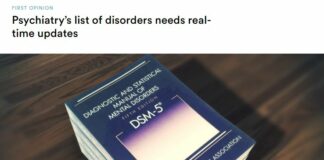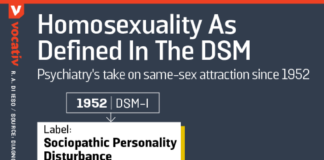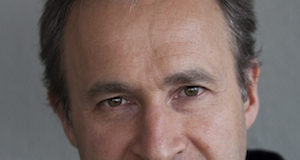Tag: DSM
“Psychiatry’s List of Disorders Needs Real-Time Updates”
In a First Opinion piece for STAT, Michael First argues that a digital DSM should allow updates between editions. The American Psychiatric Association (APA)...
“Shouting, Voting and Not Much Science: How Sexuality Becomes ‘Mental Illness’”
Tracy Clark-Flory describes “how subject to changing scientific understandings and, sometimes, even political influence the DSM can be-perhaps especially when it comes to sexuality.”
Article...
Psychiatric Ethics
When psychiatrists conduct "diagnostic" assessments on public figures, they are drawing attention to the fact that psychiatry's "diagnostic" system is more like a children's matching test than a genuine medical nosology. They are drawing attention to the fact that the Emperor has no clothes. And we all know where that leads.
Centering Lived Experience
Lately, after a number of discussions, we have been changing our practices around the issue of labels. No longer do we give a diagnosis at presentations. We place the young person’s story, as told to us, front and center. People listening rarely ask, “What is their diagnosis?” now that lived experiences are central. We are providing a sense of their struggles. We are trying.
Antidepressants Often Prescribed to Enforce Heteronormativity, Study Concludes
A new study investigating fifteen years of patient records at a Midwestern hospital found that psychiatrists almost always responded to patient complaints about their relationships by prescribing antidepressants, despite the fact that these complaints had little to do with the DSM criteria for depression. The study’s lead author, Jonathan Metzl, a professor of Sociology and Medicine, Health and Society at Vanderbilt, suggests that after the decision in 1974 to remove homosexuality from the DSM, psychiatry continued to enforce socially accepted forms of relationships through the prescription of antidepressants.
Who Will Guard the Guardians of Psychiatry?
The assertion that the so-called antidepressants are being over-prescribed implies that there is a correct and appropriate level of prescribing and that depression is a chronic illness (just like diabetes). It has been an integral part of psychiatry's message that although depression might have been triggered by an external event, it is essentially an illness residing within the person's neurochemistry. The issue is not whether people should or shouldn't take pills. The issue is psychiatry pushing these dangerous serotonin-disruptive chemicals on people, under the pretense that they have an illness.
Lancet Editorial Points to “Trouble with Psychiatry Trials”
While clinical trials make up the “bedrock of evidence-based medicine” in other specialties, psychiatry faces a number of both ethical and scientific problems related to its use of randomized control trials. According to a new editorial in The Lancet Psychiatry, the field of psychiatry research has particular problems with ethical issues in recruitment, inaccurate classification systems, and controversial placebo comparisons, and then, once the studies are finished, it often remains unclear what the “outcomes actually mean for people’s lives.”
The Psychiatry Sandcastle Continues to Crumble
Psychiatry would long since have gone the way of phrenology and mesmerism but for the financial support it receives from the pharmaceutical industry. But the truth has a way of trickling out. Here are five recent stories that buck the psychiatry-friendly stance that has characterized the mainstream media for at least the past 50 years.
Jim van Os: New Vision for Psychiatry
Jim van Os, professor of Psychiatric Epidemiology at Maastricht University and member of the Royal Dutch Academy of Science with more than 700 publications, is one of the top one percent highly cited scientists in the world.
Reflections on How We Think About and Respond to Human Suffering,...
Any attempt to establish an alternative diagnostic system to the predominantly biologic DSM-5 classifications or to initiate a transformation of the individually oriented mental health treatment systems needs to critically explore how, not only what, we think about health and healing, about mental and emotional suffering, about traumatic experiences and injustices, and the multiple forms of pain that are part of our human existence. The broad critique of the DSM-5 by so many national and international organizations and individual colleagues will in the end not be powerful and far reaching enough without this inquiry into the foundations of our thinking and without reflection about our ways of thinking.
Setting the Record Straight: The Psychiatric Legacy of Robert Spitzer
On December 25, 2015, renowned psychiatrist Robert Spitzer died. Spitzer was a giant in world psychiatry, best known as the architect of the third edition of the psychiatry’s diagnostic bible — The Diagnostic and Statistical Manual of Mental Disorders (DSM-III) — the edition that effected a turnaround and became the template for how psychiatric diagnosing has proceeded ever after. As such, this death has hardly gone unnoticed, with stories about him proliferating. Most of what is written is highly laudatory. What concerns me is how to understand his “psychiatric contribution” to society.
Is an Ominous New Era of Diagnosing Psychosis by Biotype on...
When former NIMH chief Dr. Thomas Insel speaks, people listen. Dr. Insel famously criticized the DSM a couple of years ago for its lack of reliability. He notably broke ranks with the APA by saying there were no bio-markers, blood tests, genetic tests or imaging tests that could verify or establish a DSM diagnosis of schizophrenia, bipolar or schizoaffective disorder. However in a new article he announces research that claims to have found bona-fide physiological markers that identify specific "biotypes" of psychosis. This system could, purportedly, identify a person as possessing a specific biotype of psychosis, instead of a DSM-category diagnosis.
“The Nixon-Masked Man Who Helped End Homosexuality as a Disease”
In a Forgotten History article for the Daily Beast, Brandon Ambrosino tells the story of the 1972 meeting of the American Psychiatric Association. There,...
Beyond ADHD: Moving Past the DSM Paradigm of Mental Illness
A paradigm is a way of thinking about things. For the past 60 or so years, our thinking about mental health and illness has been dominated by what can be referred to as the "DSM (Diagnostic and Statistical Manual of Mental Disorders) paradigm." What this looks like in everyday practice is that when a child is referred to my behavioral pediatrics practice for anxiety, the questions that parents, referring doctors, and teachers ask is, "Does he have anxiety disorder?" followed by "How to we manage his behavior?" and "Does he need medication?"
NIMH Funding Changes Threaten Psychotherapy Research
The National Institute of Mental Health (NIMH) is increasingly shifting its research emphasis toward attempting to uncover biomarkers for “mental diseases,” which may have dramatic consequences for research and training in clinical psychology. In an article to be published in next month’s Professional Psychology: Research and Practice, Marvin Goldfried outlines how the shift in funding priorities for psychological research is tied to the needs of pharmaceutical companies and the biological model in psychiatry.
Series on Anti-Psychiatry and Critical Theory for World Mental Health Day
To coincide with World Mental Health Day on October 10th, 2015, Verso Books, the largest independent and radical publishing house released a series of blogs on mental health and critical and antipsychiatry. The posts include pieces on R.D. Laing, colonialism, women’s oppression, delusions and art, “The Happiness Industry,” and social and institutional oppression.
Ronald Pies Doubles Down (And Why We Should Care)
This past Saturday, I was on my way back from Europe to Boston, and while on a stop in Iceland, I checked my email and was directed to a new blog by Ronald Pies in Psychiatric Times, in which he once again revisited the question of whether American psychiatry, and the American Psychiatric Association (APA), ever promoted the idea that chemical imbalances caused mental disorders. And just like when I read his 2011 writings on this subject, I found myself wondering what to make of his post. Why was he so intent on maintaining psychiatry’s “innocence?” And why did it matter?
The Inherent Unreliability of the ADHD Label
I imagine that everybody on this side of the issue knows by now that the eminent psychiatrist Jeffrey Lieberman, MD, Chief Psychiatrist at Columbia, and past President of the APA, called Robert Whitaker "a menace to society." The grounds for Dr. Lieberman's vituperation were that Robert had dared to challenge some of psychiatry's most sacred tenets! But in all the furor, it was largely ignored that in the same interview Dr. Lieberman had said something else that warrants additional discussion.
When Homosexuality Came Out (of the DSM)
With a diagnosis of schizophrenia, if internalized, comes the erosion of personhood, lowered self-esteem, shattered dreams, and a sense of disenchantment. The psychiatrist Richard Warner has even suggested that those who reject the diagnosis of severe mental illness may have better outcomes as they retain the right to construct their own narrative of personhood and define what really matters for them. Despite public education campaigns (or perhaps because of them), the stigma of mental illness is as enduring as it was 50 years ago.
Science and Pseudoscience in Psychiatric Training: What Psychiatrists Don’t Learn and...
Evidence based care is supposed to drive up standards, ensure uniformity, establish best practice, guide clinicians and protect patients. This should be celebrated. Instead, evidence-based mental health is openly disparaged, and when psychiatrists don’t get the results they want, they ignore them, suppress them, or denounce them. These attitudes have repercussions on the training of psychiatrists.
How About a Diagnostic Alternative for Use in Talk Therapy?
Note: This post originally appeared on August 18, 2014 on dxsummit.org.
On August 5 and 6, 2014, a group of roughly twenty persons met in Washington, DC...
“Mental Illness”, the DSM-5, and Dreams for a Post-Psychiatry World
If, a little over three years ago, you asked me who I was, my one and only answer would have been, “Bipolar.” It was the word that defined me, that explained my emotions and behaviors, that gave me answers to the questions, Why am I so unhappy? Why do I want to die every day? Why is it so hard to get out of bed in the morning, to shower and brush my teeth and leave the house and interact with the world? Why do I find it impossible to keep a job, a relationship, a responsibility? Why do I never feel OK?
Diagnosis Dilemma
Not long ago I had a conversation with a psychiatrist. He told me about a diagnostic dilemma he’d run up against at work; When a judge makes an unfunded treatment mandate as part of her judgment, she pressures the doctor to make a “payable” psychiatric diagnosis. If the doctor stretches the truth out of sympathy and provides an inaccurate but payable diagnosis so that his patient can have access to medical care and money to live on, he is committing fraud that can mean heavy fines and incarceration for himself.
A Challenge to “I Am Adam Lanza’s Mother”
As I write these words on a Monday evening, my spirit aches. It aches with grief for the lives lost in Connecticut last week; it aches with dread for our collective American future in Sandy Hook’s aftermath; and it aches with love and empathy for Michael, a thirteen-year old boy whose once private life has, for the last day and a half, been on display for millions to see, exploited by a mother whose opinions are representative of America’s most pervasive mass delusion: that “mental illness” is a biologically-based condition requiring psychopharmaceutical “treatment” and “mental health care”, and that “the mentally ill” are a class of Other that threatens the safety, security, and health of America.
Do Diagnoses Injure People?
Yes, a psychiatric diagnosis can be a dangerous thing to have. But, these days, so is having any medical diagnosis. The names and words of the diagnoses themselves are not so much to blame for the harm. Rather, the harm comes through the ways the diagnoses are created and how they are used.












